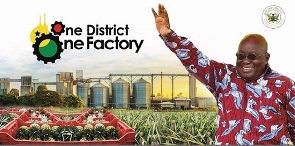 President Nana Addo Dankwa Akufo-Addo
President Nana Addo Dankwa Akufo-Addo
Key players in Ghana’s export chain, have expressed optimism in some opportunities that Ghana can leverage on to develop its export trade with the world, especially Africa, considering the African Continental Free Trade Area.
The Deputy Chief Executive, Human Resource and Administration of the Ghana Export Promotion Authority, Albert Kassim Diwura, has on Eye on Port indicated that his outfit is poised to bridge the gap between imports and exports and the industrial transformation by the present government typifies that.
“Looking at the flagship programmes of this government, for example, One District One Factory, it tells you that very soon there’s going to be huge numbers when it comes to export.”
He rationalised why the Ghana Export Promotion Authority is focusing more on the production of Non Traditional Exports as compared to the traditional exports saying, value added products will fetch the country more revenue.
“We process most of our traditional to become non-traditional which changes the whole value. That’s why we need to go into processing because a lot will happen including creation of jobs, enough foreign exchange earnings,” Albert Diwura said.
He said the national export development strategy, which is soon to be launched, will serve as driving force to bridge the gaps in the export sector, as it will clearly define the responsibilities of all players in the chain to achieve the national vision for exports.
The President of the Federation of Ghanaian Exporters (FAGE), Anthony Sikpa suggested that in government’s industrialization agenda to create factories across the country, these factories should be in proximity of farms in order to create an efficient supply chain.
The Secretary General for the International Chamber of Commerce, said that a viable way to mitigate the logistics challenge, is by efficient mass transportation. He appealed for the revitalization of Ghana’s railway system, as it would augment the agricultural sector.
“Get the infrastructure right. I have always been keen on rail transport. We need mass transportation to move our goods to the port.”
He also asked exporters to take advantage of transshipment services, to be able to transport their products to other countries at more efficient rates now that Ghana’s ports are expanded and positioned to take bigger vessels.
“We have done well by expanding our ports. Now we can take in bigger vessels. What we have in there can encourage a lot of transshipment,” he added.